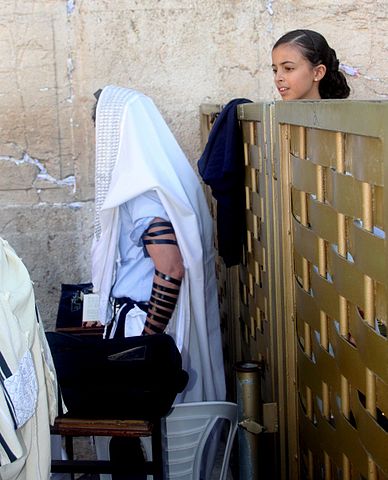
by Michelle Brafman
A Hand Through the Mechitza

Wikimedia/Peter van der Sluijs
My family is hitting the b’nai mitzvah circuit hard these days. Our daughter is in seventh grade, and we’ve been spending our Shabbats visiting various local synagogues to celebrate our friends’ simchas.
When we travel to the modern Orthodox synagogue, the men and women are separated by a mechitza, a partition made of wood and plexiglass. I grew up in a synagogue with a mechitza, and I never thought much about this gender segregation until my first semester in college, when Sandra Bartky and Andrea Dworkin opened my eyes to the myriad ways women were marginalized. I rejected the Orthodox rationale that women did not need to perform rituals in the synagogue because we are more spiritually evolved or that our energies are best directed toward keeping the dietary laws, educating the children, and lighting the Sabbath candles.
My feelings about mechitzas lasted until four years ago, when I brought my daughter to a modern Orthodox synagogue for her first time. Our friend, Debbie, and her husband had invited us to their son’s bar mitzvah. Debbie is a dynamo, one hundred layers deep, and sings like a cross between Sheryl Crow and the lead Dixie Chick. In the months leading up to the simcha, she shared her sadness about not being permitted to participate in the service. I felt her hurt.
When we arrived at shul, I grudgingly watched my son and husband file into the men’s section. I stood at the entrance of the women’s section, and a friend motioned for my daughter and me to sit with her. I opened my prayer book, and my friend leaned her head toward mine and I don’t remember what she said, but she’s very funny, and we laughed, and our easy intimacy released a torrent of memories. I remembered that I’d learned how to eavesdrop behind the mechitzah. As a child, I kept track of the regulars’ pregnancies, divorces, and illnesses and deaths in their families. And these women kept track of me. I felt protected and content in this world, with its own set of rules and internal consistencies.
Debbie’s son davened with authority and soul, buoyed by the love of the men who stood next to him. Debbie glowed too, and that all felt very familiar and electric. By the time we drove home, I was too lost in thought and memory to ponder Debbie’s celebrating her son’s bar mitzvah from behind the mechitza.
Two years later, Debbie led the effort to create a women’s tefillah service at her synagogue, and her daughter blazed the trail for young women to celebrate their bat mitzvahs during this service. Watching this young girl claim a public holy space left me breathless. Here’s the hitch though. Only nine men are allowed to attend the service. Ten men would comprise a minyan, and therefore the service would need to be conducted in accordance with the Orthodox rules which forbid women from participating. Because the women’s tefillah service technically “doesn’t count,” women perform every function of the service. The men sit behind the plexiglass, barred from the bimah, as Debbie had during her son’s bar mitzvah.
My daughter and I recently attended a bat mitzvah at this congregation. We walked into the women’s tefillah service while the bat mitzvah led the early prayers with confidence and grace. My daughter went off to find her friends, and I sat alone. I relished the intimacy and richness of this women’s service, made only more powerful by the fact that women were leading it. “We’ve come a long way, baby,” I wanted to call out to my daughter and her friends and tell them that when I was their age, I wouldn’t have dreamed of cradling the Torah in my arms. I also wanted her to appreciate Debbie’s fight for these girls to have the chance to perform this rite in such a magnificently public way.
Debbie arrived and took a seat next to mine. I was quiet at first, content to listen to her nice voice reciting familiar melodies. I joined in, but tentatively. Her voice is deeper and stronger than mine, but I could still hear us both. My eyes wandered to the nine men sitting together, behind the glass, and then over to my daughter and her friends. My daughter has not been denied any opportunity because of her sex or religion. I want her to know what it feels like to sit in the back of the bus and, in this moment of feminine spiritual empowerment, notice the nine men who were silenced. An ugly part of me also wanted the nine men to experience the feeling of “not counting” in a minyan and to relay that feeling back, somehow, to their side of the mechtiza.
The bat mitzvah completed her flawless Torah and haftorah reading, and it was time for the congregation to celebrate by tossing SunKist fruit jelly candies in her direction. Soon we would leave this chapel and file into the larger sanctuary to join the rest of the congregation. After services, the bat mitzvah would deliver her brilliant D’var Torah to the entire shul, yet during the service, our presence would not officially count.
A little girl in a pretty dress wandered over to the mechitza. She reached her tiny hand through the space between wood and plexiglass, into the men’s section, and offered the bat mitzvah’s uncle a candy to throw over the mechitza. Rest assured, my daughter will at some point feel marginalized during her life, and I trust that she will learn to cope. My bigger hope is that when she is enjoying her membership in the majority, she will approach that mechitza. She will reach her arm through the divider with an open hand and make her own offering.